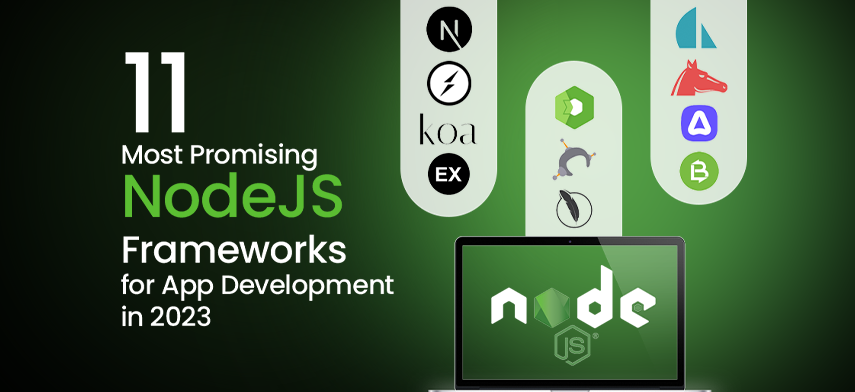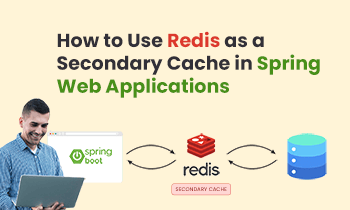With each passing day, the demand for web and mobile applications is growing by leaps and bounds. As a result, app developers are testing various frameworks to satisfy their software development requirements.

With superior tooling, libraries, templates, and automation capabilities, NodeJS frameworks have emerged as a potential choice. They are successfully helping developers overcome app development roadblocks with ease.
However, choosing a NodeJS framework is tough, especially when there are various platforms available across the market. Not to worry, today’s blog will introduce you to the most important ones and help you choose the right framework for your app development project. So, let’s dive right in.
11 Best Node JS Frameworks to Use in 2023
Node JS frameworks play a vital role in ensuring stable and secure app development. We have combined the ones that are commonly preferred by developers and decision-makers worldwide.
1 Express.js
Express.js is the most popular and classic example of a Node JS MVC framework. It is a simple yet superior platform considered the de facto standard for Node JS. With decent programming knowledge, you can easily get started with this web framework.
Express.js is a NodeJS frontend framework backed by a robust and asynchronous architecture that helps you fulfill your Node JS development requirements with ease. You can easily integrate it with speedy I/O operations alongside improving client-server communication.
Key Features
- Faster server-side development
- Systematic organization of functions with Middleware
- Advanced routing mechanism
- Top-notch templating engines
- Dedicated test coverage and debugging
You can use it to –
- Create a solid API.
- Handle and execute multiple operations independently.
- Build all types of web and mobile apps, especially enterprise-grade or browser-based apps.
2 Koa.js
Koa.js stands amongst the widely adopted NodeJS frameworks by software professionals across the globe. It is the next-generation web framework to create state-of-the-art NodeJS applications and digital solutions.
Its async functions enable your developers to avoid callbacks thereby enhancing error-handling capabilities. The framework doesn’t combine any middleware. Instead, it has built-in functionalities that help you write servers quickly and efficiently.
Key Features
- Lightweight and customizable framework
- Cascading middleware
- Robust code management
- Supports proxy and content negotiation
You can use it to –
- Ensure high performance for your apps.
- Handle small and large-scale web development projects.
- Build feature-rich applications.
3 Socket.io
We need Node JS web frameworks like Socket.io to establish a stable connection with WebSocket. It brings novel capabilities to your table, like automatic reconnection or fallback to HTTP long-polling.
With Socket.io, you can easily scale to desired servers and send events to all connected users. It enables straightforward and bidirectional client-server communication while helping you deliver apps that focus on providing seamless user experiences.
Key Features
- Binary support
- Multiplexing support
- Real-time analytics for code
- Error detection and auto-correction
- Packet buffering
You can use it to –
- Configure real-time responses and requests.
- Achieve low-latency communication for desired platforms.
- Build real-time applications where servers push data without any client-side request.

4 Nest.js
Nest.js is one of the most progressive NodeJS backend frameworks that offer the best developer experience. Its modular architecture allows your developers to exploit multiple libraries with ease.
With Nest.js at your disposal, you get enough room to explore the latest JavaScript features and design contemporary applications and digital products. What makes it more important is its versatility in building different types of backend applications.
Key Features
- Microservice architecture
- modularization
- Dependency injection container
- Express and Fastify support
- OOP, FP, and FRP support
You can use it to
- Build dynamic, scalable, and multilayered enterprise applications.
- Utilize third-party modules.
- Establish a stringent testable environment for your application.
5 Sails.js
Our list of the top NodeJS frameworks would be incomplete without mentioning Sails.js. It is a Node JS realtime framework that helps you create production-ready applications within weeks.
Sails.js mimics the popular MVC pattern from web application frameworks like Ruby on Rails to ensure modular, data-driven development. It can easily integrate with various JavaScript frameworks and is compatible with all databases in existence.
Key Features
- Auto-generated REST APIs
- Frontend agnostic
- WebSocket integration
- Flexible asset pipeline
- Declarative, reusable security policies
You can use it to
- Build custom, enterprise-grade NodeJS web solutions and APIs.
- Deliver gaming apps, social media apps, and chat apps.
- Make the most out of JavaScript.
6 Total.js
It is a fully functional NodeJS framework powered by a combination of practices, UI components, and JavaScript libraries. It helps to write entire applications in JavaScript without having to deal with external dependencies.
Total.js is accessible in versions like CMS, Eshop, and HelpDesk. Each of these variants has its own set of capabilities that help you take full advantage of REST service, IoT integrations, and cloud-based development.
Key Features
- Multiple-database compatibility
- Visual programming interface
- Real-time file merging
- Tangular template engine
- Serverless architecture
- HTML, CSS, and JS compressor
You can use it to
- Deliver a CMS-like experience.
- Satisfy eCommerce web development requirements.
- Switch to low-code development.
7 Hapi.js
Hapi.js is the best NodeJS framework that caters to your web app development needs with utmost precision. It consists of built-in plugins that help your developers avoid the complexities of using unreliable middleware.
The framework is highly reliable and rich in its security aspects while offering out-of-the-box functionalities with minimal overhead. It is lightweight and offers an easy-to-learn interface that allows you to create apps that your users would love.
Key Features
- Integrated authorization and authentication architecture
- Secure defaults and code management
- Namespace protection
- Zero routing conflicts
- Plugin dependencies
You can use it to
- Develop proxy servers, REST APIs, and other desktop apps.
- Fulfill enterprise-grade backend needs.
- Support large, distributed, and remote teams.
8 Feathers.js
Another platform in our list of top-tier NodeJS frameworks is Feathers.js. The microservices framework is widely known for its capabilities to work with various popular frontend technologies like React Native, ReactJS, Vue.js, and Angular.
Feather.js supports multiple databases. It simplifies the process of creating web and mobile apps by avoiding the complexities of RESTful APIs. Moreover, it helps you deploy and interact with app features seamlessly.
Key Features
- Flexible plugins
- Datastore agnostic
- Automatic RESTful APIs
- Configuration for Socket.io and Primus
- Relational and non-relational database support
You can use it to
- Create real-time apps and REST APIs using JavaScript or TypeScript.
- Build prototypes and production-ready apps within stipulated timelines.
- Develop service-oriented solutions.
9 Loopback.io
When it comes to choosing modern NodeJS API frameworks, Loopback.io is the one that you cannot afford to miss out on. It is highly extensible and easily connects your devices and browsers to desired data and services.
Written in TypeScript, this framework is backed by new-age repositories, components, mixins, and more. It runs on-premises or in the cloud, helping developers establish a progressive production environment to create desired APIs.
Key Features
- GraphQL support
- CLI with API management
- Built-in API explorer
- Browser support (JSONP and CORS)
- Built-in role-based access controls
You can use it to
- Handle API requests and responses.
- Create dynamic, end-to-end REST APIs.
- Run dynamic queries on browsers, devices, and servers.
10 Adonis.js
Adonis.js is a must to include in our Node JS best framework list as it consists of everything that you need to create a web application or API server. It saves a lot of time and effort as you don’t need to download and assemble hundreds of packages for your app development.
It is one of the most commonly used MVC NodeJS frameworks based on a structural pattern that emulates Laravel. It has its own set of packages and a built-in template engine to reduce the time to market.
Key Features
- Rich routing layer
- Scheme-based validator
- First-party packages
- WebSocket support
- Lifecycle dependency management
You can use it to
- Create server-side web apps.
- Develop web services that return JSON responses from a controller.
- Ensure a delightful testing experience.
11 Derby.js
It is a full-stack NodeJS web framework backed by robust templates that can be rendered on the server or in the browser with ease. You can define live bindings between the view and model to observe instant view updates with data alterations.
Derby.js helps your developers to synchronize data across servers and clients with automatic conflict resolution. It is a go-to option to enhance your coding capabilities and work with legit tools like browserify and npm.
Key Features
- Real-time collaboration
- Racer engine support
- Code customizations
- Offline usage and conflict resolution support
- Operational transformation of JSON and text
You can use it to
- Create modern, web-based messaging applications.
- Develop solutions that run in both NodeJS and browsers.
- Ensure faster loading times.
Conclusion
With all the above, you would have surely understood the importance of NodeJS frameworks in today’s digital age. These frameworks can make your app development process scalable, easier, and cost-effective than ever before.
There are various other frameworks for NodeJS that can help you deliver personalized experiences to your target audience. You need to choose the one that best suits your business requirements and helps your project thrive.
Selecting the right NodeJS framework is really important to create applications just the way you want. Contact NodeJS professionals at Mobisoft and start your app development project right away.

Author's Bio:

Pritam Barhate, with an experience of 14+ years in technology, heads Technology Innovation at Mobisoft Infotech. He has a rich experience in design and development. He has been a consultant for a variety of industries and startups. At Mobisoft Infotech, he primarily focuses on technology resources and develops the most advanced solutions.


